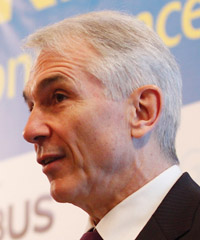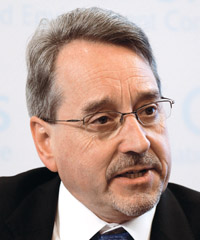Main Story
WAY NOT TO GO
The European Union surprised the global aviation industry with its announcement in October that it would revive its emissions trading scheme for aviation, albeit in a revised form, until carbon neutral growth strategies apply in 2020. Will this do lasting damage to the goal of establishing a global industry emissions reduction regime?
November 1st 2013
An historic emissions agreement, reached after intense negotiations at the recent International Civil Aviation Organization’s 38th Assembly, is threatened with fragmentation after the European Union said it would restart the Emissions Trading Scheme (ETS) clock on all flights, including international services, passing through its air space. Read More »
 |
| 'It is a sovereign right to regulate aviation in and around our own EU airspace. I very much hope our partners will see this in the spirit in which it is being presented' |
| Connie Hedegaard Commissioner for Climate Action European Union |
Aviation industry leaders worldwide have expressed “concern” at the decision, which was announced by the iconoclastic EU Commissioner for Climate Action, Connie Hedegaard, a little more than a week after representatives of 191 states agreed to develop a global aviation Market-Based Measure (MBM) that would achieve carbon neutral growth by 2020.
Ms Hedegard said: “Europe is taking responsibility to reduce emissions within its own airspace until global action begins. It is a sovereign right to regulate aviation in and around our own EU airspace. I very much hope our partners will see this in the spirit in which it is being presented.”
Atur Runge-Metzger, director European Commission International & Climate Strategy, said the Commission is acting in good faith. “Limiting it to EU airspace and not touching on somebody else’s airspace.That’s our interpretation of what was said in Montreal.”
So far, the EU’s “partners” have not quite seen it that way.
Tony Tyler, the director general and CEO of the International Air Transport Association (IATA) said airlines “were concerned the Commission is now recommending a course of action that has the potential to undermine the goodwill that has brought us to this point”. Tyler hoped that before the European Parliament voted on the proposal to “restart the clock”, there would be wider stakeholder engagement, including with the international community. “It is of critical importance to ensure that everybody – including Europe – stays focused on the big picture of Carbon Neutral Growth (CNG) by 2020,” he said.
The European Airlines Association believes the EU ETS should be suspended entirely until the outcome of the 2016 ICAO Assembly.
“Everyone went away from the ICAO assembly happy. It was a fantastic achievement and the EU agreed about this in the press. What the EU should understand is that we need an aviation solution to a climate problem and not a climate solution to an aviation problem,” said IATA.
 |
| IATA director general and CEO, Tony Tyler: focus must remain on the big picture of carbon neutral growth by 2020 |
Abdul Wahab Teffaha, the secretary general of the Arab Air Carriers Organization, said any new charges would be a problem. If the EU decides to go ahead and capture emissions from non-European airlines, “and I hope it does not, then it will be back to trade wars”, he said.
While there has been no official reaction from China, one of the main opponents to the scheme is India, which accused the EU of defying the agreement hammered out in Montreal.
“What they (European Commission) has done is in total conflict with the ICAO agreement. The multi-level body has to intervene in this matter,” said India’s secretary for civil aviation, K.N. Srivastava.
Airlines4America said requiring foreign carriers to participate in the EU ETS without the consent of the airlines’ countries of registry “flies in the face” of the ICAO agreement.
Republican Senator, John Thune, informed the EC that any such effort to charge U.S. carriers would be in direct violation of legislation signed into law last year.
The global airline industry had hoped the ICAO deal, where members agreed to design a global ETS by 2016 for introduction in 2020, had finally heralded a smoother path to achieving the industry’s target of a single global MBM to reduce emissions from aviation.
The EU ETS applied to airlines from January 2012, when all carriers flying into and from EU airspace were charged from their point of take-off, even if the flight originated outside European airspace. China and India refused to allow their carriers to participate in the EU ETS. The U.S. passed legislation banning airlines from joining the scheme. All protested that Europe had no right to charge for emissions extra-territorially.
In the face of the fierce global resistance, the EU announced late last year that it would “stop the clock” or freeze charges on non-European carriers for twelve months - until May 2014 – to allow the airline industry time to negotiate a deal at the ICAO Assembly. Now, it plans to restart the clock to cover the period from 2014 to 2020, though this time international carriers would be charged only for their emissions within European airspace.
Some members of the European Parliament have complained the ICAO agreement is too weak and argue it hinders the EU’s ability to apply its law to all flights over European air space. “The European Parliament will not agree that until 2020 we only cover intra-European flights,” said German Christian Democrat, Peter Liese, who steered the original EU ETS into law. “Unfortunately, we have no guarantee the system will be introduced in 2020 and that the benefit for the environment is substantial. There are too many ifs and buts,” Liese said.
 |
| AAPA director general, Andrew Herdman: developing countries are likely to strongly oppose the revised EU ETS |
In the three years leading to the 39th ICAO Assembly in 2016, the 191 ICAO members have been tasked with developing the design details of the MBM, including standards for monitoring, reporting and verifying emissions.
Andrew Herdman, director general of the Association of Asia Pacific Airlines (AAPA), said the ICAO agreement clearly demonstrated the benefits of international co-operation and a partnership effort involving an industry committed to a truly sustainable future for aviation. He said the inclusion of international airlines without the consent of their respective governments is likely to meet with strong opposition, particularly from major developing countries.
The EU decision is not the only potential bugbear in proposed MBM discussions. Significant differences include the strong argument by developing nations, particularly China, that developed countries such as the U.S. should carry a greater share of the environmental burden.
Said Herdman, a member of the aviation cross-industry delegation at the ICAO Assembly, “the challenge will be to ensure the collective industry commitment to carbon neutral growth from 2020 is implemented in a way that is fair and equitable, avoiding competitive market distortion, whilst reconciling the differing interests and perspectives of developed and developing nations.”
Paul Steele, executive director of the industry-backed Air Transport Action Group (ATAG) said the negotiations were tough. “The global politics and interests of 191 states had to be taken into account. We have seen the same struggles at the UN climate talks,” he said.
Ironically, before the EU announced its intention to propose charging foreign airlines for their emissions again, the aviation industry had unanimously praised “the important role” the EU had played as a catalyst for discussions by stopping the clock on extra-European flights. ATAG’s Steele said the EU must decide how to respond, adding that “the resolution sent a fairly clear message to them that other states would not be willing to have measures applied to their airlines”.
| 'What the EU has done is in total conflict with the ICAO agreement. The multi-level body has to intervene in this matter' |
| K.N. Srivastava India’s secretary for civil aviation |
European action aside, the other critical challenge to finalizing a global scheme is finding a way to satisfy both developed and developing nations that the new MBM will be fair and equitable to all. Insiders at the ICAO Assembly said existing differences between countries sharpened at the talks over the issue. China and Saudi Arabia called for ICAO to recognize the principle of “common but differentiated responsibilities (CBDR)”, under the UN’s climate change convention. CBDR requires rich countries to assume a larger burden in global efforts to reduce carbon emissions. It has deadlocked negotiations for years.
The introduction of the CBDR principle into the ICAO resolution happened at the last minute and is certain to be a source of conflict in discussions. The U.S., Australia and some European countries raised official “reservations” about its inclusion, meaning they are likely to raise concerns at the 2016 meeting.
Many observers believe an MBM that allows for a difference between developed and developing countries could contravene ICAO’s own principle of non-discrimination and that such an MBM may create an unintended competitive advantage for airlines that have significant global market share, but are registered in developing countries.
China and Russia also voiced reservations about specifying an industry-backed target in the resolution for CNG in the aviation sector by 2020, which could mean they will seek to have the 2020 target revised at the 2016 ICAO Assembly.